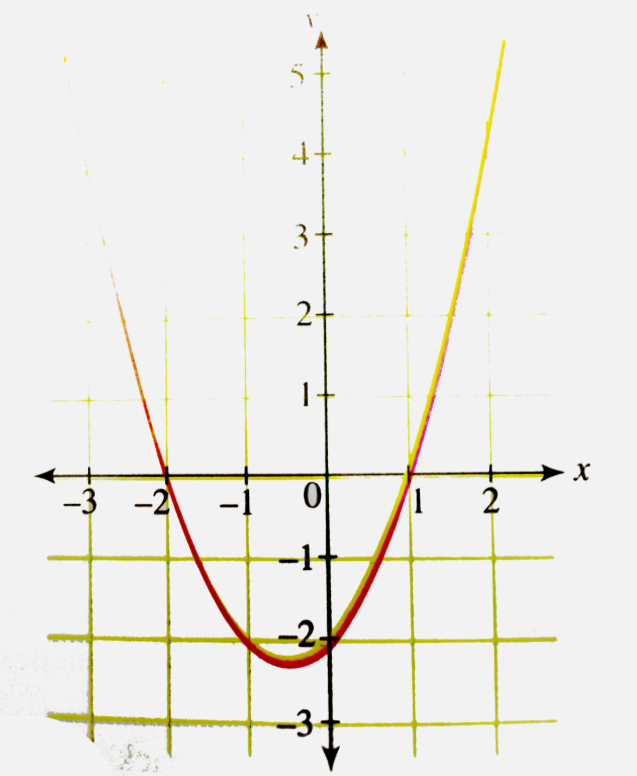If the sum of the roots of an equation is 2 and the sum of their cubes is 98, then find the equation.
To find the quadratic equation given the sum of the roots and the sum of their cubes, we can follow these steps:
Step 1: Define the Roots
Let the roots of the quadratic equation be α and β.
Step 2: Use Given Information
We know:
- The sum of the roots:
α+β=2
- The sum of their cubes:
α3+β3=98
Step 3: Use the Identity for Sum of Cubes
We can express the sum of cubes in terms of the sum and product of the roots:
α3+β3=(α+β)(α2−αβ+β2)
We can also express α2+β2 using the square of the sum of the roots:
α2+β2=(α+β)2−2αβ
Thus,
α3+β3=(α+β)((α+β)2−3αβ)
Step 4: Substitute Known Values
Substituting α+β=2:
α3+β3=2((2)2−3αβ)=2(4−3αβ)
Setting this equal to 98:
2(4−3αβ)=98
Step 5: Solve for αβ
Divide both sides by 2:
4−3αβ=49
Rearranging gives:
−3αβ=49−4
−3αβ=45
αβ=−15
Step 6: Form the Quadratic Equation
The general form of a quadratic equation with roots α and β is:
x2−(α+β)x+αβ=0
Substituting the values we found:
x2−2x−15=0
Final Equation
Thus, the required quadratic equation is:
x2−2x−15=0
---
Let the roots of the quadratic equation be α and β.
We know:
- The sum of the roots:
α+β=2
- The sum of their cubes:
α3+β3=98
We can express the sum of cubes in terms of the sum and product of the roots:
α3+β3=(α+β)(α2−αβ+β2)
We can also express α2+β2 using the square of the sum of the roots:
α2+β2=(α+β)2−2αβ
Thus,
α3+β3=(α+β)((α+β)2−3αβ)
Substituting α+β=2:
α3+β3=2((2)2−3αβ)=2(4−3αβ)
Setting this equal to 98:
2(4−3αβ)=98
Divide both sides by 2:
4−3αβ=49
Rearranging gives:
−3αβ=49−4
−3αβ=45
αβ=−15
The general form of a quadratic equation with roots α and β is:
x2−(α+β)x+αβ=0
Substituting the values we found:
x2−2x−15=0
Thus, the required quadratic equation is:
x2−2x−15=0
Topper's Solved these Questions
Similar Questions
The sum of three numbers in A.P. is 12 and the sum of their cubes is 288. Find the numbers.
View SolutionThe sum of an infinite G.P. is 57 and the sum of their cubes is 9457, find the G.P.
View SolutionThe sum of an infinite G.P. is 57 and the sum of their cubes is 9457, find the G.P.
View SolutionThe sum of infinite number of terms of a G.P. is 4 and the sum of their cubes is 192. Find the series.
View SolutionSum of the roots of the equation x2+7x+10=0
View SolutionIf the sum of two numbers is 5 and the sum of their cubes is 35, find the sum of their squares
View SolutionIf the sum of the roots of the equation x2+px+q=0 is 3 times their difference, then
View SolutionThe sum of two numbers is 7 and the sum of their cubes is 133. Find the sum of their squares
View SolutionConsider the graph of y = f(x) as shown in the following figure.

(i) Find the sum of the roots of the equation f (x) = 0.
(ii) Find the product of the roots of the equation f(x) = 4.
(iii) Find the absolute value of the difference of the roots of the equation f(x) = x+2 .
View SolutionIf the sum of the roots of the equation ax2+bx+c=0 is equal to sum of the squares of their reciprocals, then bc2,ca2,ab2 are in
View Solution
